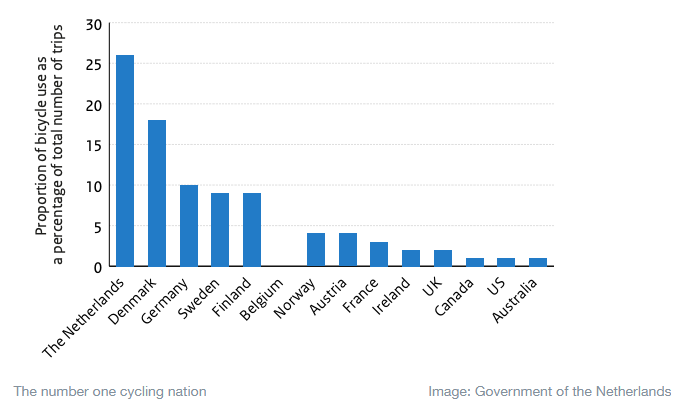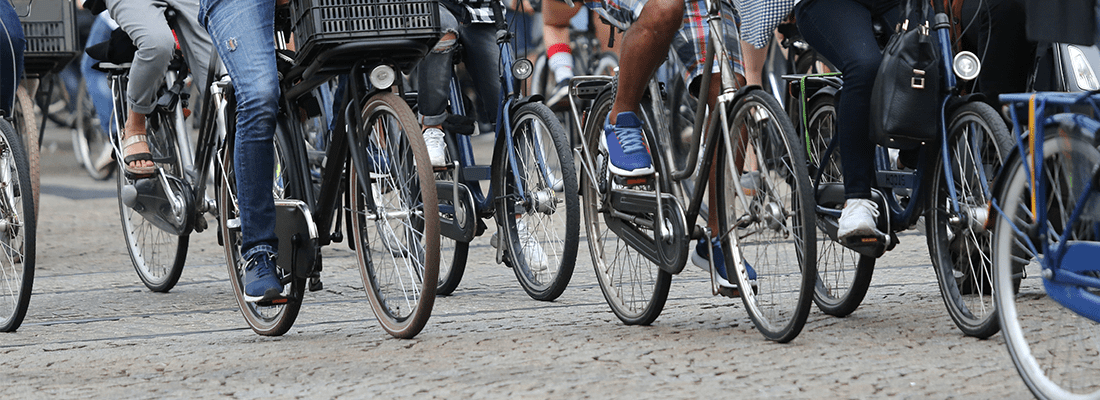The Netherlands is paying people to cycle to work

There are more bicycles than people in the Netherlands and they account for almost half of all journeys between home and work in the city of Amsterdam alone. It’s small wonder the country proudly calls itself the “unrivalled number one bicycling nation” in the world.

Being a relatively flat country no doubt helps encourage people to get on their bike. As does the expanse of cycle paths and lanes that keep bikes separate from other traffic. But there is a little-known additional incentive for Dutch people to get on their bike – tax credits.
Every kilometre cycled could earn you an extra $0.22, tax-free, paid straight into your pay packet. This works in much the same way that someone driving their own car for business purposes is able to claim back a fixed sum related to the distance travelled. But the bottom line is that cyclists could be earning money simply by riding to and from work.
The Netherlands isn’t the only country offering financial incentives to get people out of their cars and using pedal power instead of fossil fuel.
In the UK, the Cycle to Work scheme operates a lease-to-own model allowing employees to get discounted bikes and equipment through their employer. The employer buys the bicycle and leases it to the employee over a set period – usually 12 months. The monthly payments are deducted from gross earnings, meaning an effective saving of 32% for basic-rate taxpayers. There is also a mileage allowance made available for British cyclists who use their bikes for business purposes, of around $0.26 per mile.
A similar tax-free bike-purchase scheme operates in the Netherlands as well as in Belgium, where a payment of $0.26 per kilometre is available to cyclists.
In the tiny landlocked country of Luxembourg, sandwiched between France, Germany and Belgium, employees can take advantage of a $340 tax rebate to be used to buy a bicycle. Meanwhile, in France, there is a per-kilometre reimbursement scheme for cyclists due to come into force next year. It will allow a tax-free payment of roughly $230 per year to public employees – private businesses will be able to double that amount if they wish.
Europe’s other cycling superpower, Denmark, doesn’t currently offer any tax incentives for cyclists, yet still manages to coax a growing number of people on to two wheels every year, at least in the capital, Copenhagen.
There are a range of tax breaks aimed at commuters in the US, too, including a $20 per month allowance for cycling expenses. However, the 2017 Tax Cuts and Jobs Act changed all that and cycling costs can no longer be deducted from pre-tax pay, effectively making it a little more expensive for some American cyclists. In the tiny landlocked country of Luxembourg, sandwiched between France, Germany and Belgium, employees can take advantage of a $340 tax rebate to be used to buy a bicycle. Meanwhile, in France, there is a per-kilometre reimbursement scheme for cyclists due to come into force next year. It will allow a tax-free payment of roughly $230 per year to public employees – private businesses will be able to double that amount if they wish.
Written by Sean Fleming
Find the original article here.
Share your story
Do you have an innovation, research results or an other interesting topic you would like to share with the professionals in the infrastructure, traffic management, safety, smart mobility and parking industry? The Intertraffic website and social media channels are a great platform to showcase your stories!
Please contact our Sr Brand Marketing Manager Carola Jansen-Young.
Are you an Intertraffic exhibitor?
Make sure you add your latest press releases to your Company Profile in the Exhibitor Portal for free exposure.


